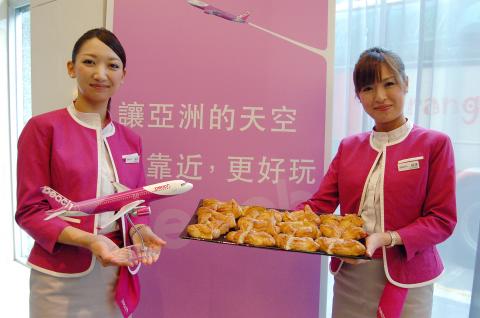Peach Aviation, a low-cost carrier based in Japan, said on Tuesday that it would make its debut in Taiwan on Tuesday next week, becoming the 11th foreign budget airline operating in Taiwan.
The company, which was founded last year and is Japan’s first low-cost carrier, said that it would operate one service per day between Osaka and Taipei until Dec. 15, after which it would offer two daily flights.
The airline said it aimed to tap into the low-cost aviation market in Taiwan amid an increase in travel between the two countries.

Photo: Tseng Hung-ju, Taipei Times
“We will especially focus on the needs of female travelers as we know they are often the decisionmakers in travel arrangements,” Peach Aviation chief executive officer Shinichi Inoue said at a press conference in Taipei.
For instance, the airline will offer Peach Danishes on the plane for ¥300 each, because the pastry has become popular among the airline’s female passengers, Inoue said.
A joint venture between All Nippon Airways and First Eastern Investment Group in Hong Kong, the carrier will offer one-way fares ranging between NT$2,780 and NT$10,780, depending on market demands.
Inoue said he was expecting flight capacity to reach at least 70 percent, and said that the company did not rule out launching more Japan-Taiwan routes in the near future.
Initial response to the Japanese no-frills company has been positive, according to Inoue, who said that more than 85 percent of the seats on its inaugural flight have been booked.
Peach Aviation’s attempt to explore market potential in Taiwan is the latest such venture recently by a foreign low-cost carrier.
Singapore-based Scoot Airlines launched operations in Taiwan last month.

Nvidia Corp CEO Jensen Huang (黃仁勳) today announced that his company has selected "Beitou Shilin" in Taipei for its new Taiwan office, called Nvidia Constellation, putting an end to months of speculation. Industry sources have said that the tech giant has been eyeing the Beitou Shilin Science Park as the site of its new overseas headquarters, and speculated that the new headquarters would be built on two plots of land designated as "T17" and "T18," which span 3.89 hectares in the park. "I think it's time for us to reveal one of the largest products we've ever built," Huang said near the

China yesterday announced anti-dumping duties as high as 74.9 percent on imports of polyoxymethylene (POM) copolymers, a type of engineering plastic, from Taiwan, the US, the EU and Japan. The Chinese Ministry of Commerce’s findings conclude a probe launched in May last year, shortly after the US sharply increased tariffs on Chinese electric vehicles, computer chips and other imports. POM copolymers can partially replace metals such as copper and zinc, and have various applications, including in auto parts, electronics and medical equipment, the Chinese ministry has said. In January, it said initial investigations had determined that dumping was taking place, and implemented preliminary

Intel Corp yesterday reinforced its determination to strengthen its partnerships with Taiwan’s ecosystem partners including original-electronic-manufacturing (OEM) companies such as Hon Hai Precision Industry Co (鴻海精密) and chipmaker United Microelectronics Corp (UMC, 聯電). “Tonight marks a new beginning. We renew our new partnership with Taiwan ecosystem,” Intel new chief executive officer Tan Lip-bu (陳立武) said at a dinner with representatives from the company’s local partners, celebrating the 40th anniversary of the US chip giant’s presence in Taiwan. Tan took the reins at Intel six weeks ago aiming to reform the chipmaker and revive its past glory. This is the first time Tan

CUSTOMERS’ BURDEN: TSMC already has operations in the US and is a foundry, so any tariff increase would mostly affect US customers, not the company, the minister said Taiwanese manufacturers are “not afraid” of US tariffs, but are concerned about being affected more heavily than regional economic competitors Japan and South Korea, Minister of Economic Affairs J.W. Kuo (郭智輝) said. “Taiwan has many advantages that other countries do not have, the most notable of which is its semiconductor ecosystem,” Kuo said. The US “must rely on Taiwan” to boost its microchip manufacturing capacities, Kuo said in an interview ahead of his one-year anniversary in office tomorrow. Taiwan has submitted a position paper under Section 232 of the US Trade Expansion Act to explain the “complementary relationship” between Taiwan and the US